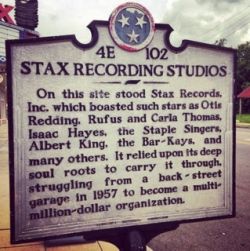History of Soul Music Part II
The Stax Records Story
Stax/Volt Records was founded in 1957 in Memphis under the name of Satellite Records. Satellite by two white businesspeople, Jim Stewart and his sister Estelle Axton. (
STewart/AXton = Stax).
Early on most of Satellite's recordings were country music recordings which reflected the musical tastes of label co-owner Stewart, who played fiddle in a country music band. The move of Satellite Records into recording R&B artists was primarily the work of Rufus Thomas, a deejay on a black radio station, who was also a respected R&B singer in his own right.
In 1960, Satellite Records relocated it's studios into the abandoned Capitol Movie Theater, at 926 East McLemore Avenue in South Memphis, the heart of the Memphis black community. Jim Stewart opened the Satellite Record store next to the Stax studios which carried a full line of soul music on all labels, not just Stax. Satellite Records survives to this day in it's original location next to the Stax Museum, housed in the original Stax studios.
 The legendary Stax recording studios in the mid 1960s
The legendary Stax recording studios in the mid 1960s
The workplace culture at Stax was a bit different from the fair minded, progressive but highly professional atmosphere at Atlantic Records in New York. Owners Jim Stewart and Estelle Axton often used the analogy of "one big family" to describe Stax Records, and portrayed themselves as the parental figures who took care of their "children", the black recording artists in their "family". Since Stewart and Axton were white Southerners, this characterization of their black artists appeared to infantalize them as helpless children. There were very few complaints from the artists because the reaction of a typical Southern white to a black soul singer in the early Sixties was hostile and often violent. By all accounts, Stewart and Axton paid out the royalties in a timely manner and gave their artists the creative space to grow. It should be said that Stewart & Axton treated Stax artists far better than the tyrannical Barry Gordy the black owner of Motown records who treated many of his black artists like field hands on a plantation.
The first release R&B release by Satellite Records was Cause I Love You a duet sung by Rufus Thomas & his daughter Carla. Alantic Records picked up the distribution rights to the single and the song sold 40,000 units, by far the largest selling release at Satellite Records to that date.
Atlantic's distributionship of the Rufus & Carla Thomas single laid the groundwork for a unique business partnership between Atlantic Records in New York and the newly started R&B label in Memphis.
The renaming of the label to Stax was a result of the newly formed business partnership with Atlantic Records.
Satellite Records didn't amount to much until Stewart & Axton partnered with Atlantic who had the distribution contacts, cash resources & technical expertise to transform Stax into a major label. By 1965 Stax Records had grow from a regional label into national label powerhouse with a roster of some of the leading R&B artists of the era.
In 1962, Stax created a subsidary label, Volt Records, primarily to accommodate their new star performer, Otis Redding. The newly passed federal law on payola was the reason for recording Otis on a subsidiary label. At the time, radio station programmers were banned from playing more than 2 songs by one single label in the airplay rotation at any given time, so record labels got around the ban by forming subsidiary labels, which technically complied with the language of the law. Atlantic formed the subsidary label Atco Records for the same purpose.
Otis was an extraordinary talent and by the time Otis was half-way through first audition song for Stax, owner Jim Stewart knew that Redding was the future superstar that would bring financial solvency to his struggling label. When Otis wrapped his first take of that first audition song "These Arms of Mine" Stewart practically leaped over the soundboard with a recording contract for him to sign.
As a result of the partnership Atlantic Records retained the rights to nearly all of the Stax Records back catalog between the years 1961 and 1968, after the Atlantic/Stax partnership was dissolved in 1968. That included the rights to the lucrative back catalog of Otis Redding at Volt Records. This may seem irrelevant, but keep that in mind because the financial future of Stax Records rested largely on regaining the rights to Otis Redding's music if the Stax/Atlantic partnership was dissolved.
 Photo: Otis Redding brings down the house at the Monterey Pop Festival, six months before his death
Photo: Otis Redding brings down the house at the Monterey Pop Festival, six months before his death
For five years, Otis Redding was largely unknown to white audiences. Even though he was the top performer on the R&B chart, Top 40 radio (
i.e. white radio) programmers refused to play Otis' records on the shaky premise that his raw signing style only appealed to black audiences. Otis finally broke through to a large white crossover audience following his barn burning appearance at the Monterey Pop Festival in June 1967. Six months later, on December 10,1967, Otis was killed in an airplane crash while flying from Cleveland to a gig in Madison Wisconsin.
At the time of his death Otis was a superstar on black radio stations, sold tens of thousands records and was routinely at the top of the Billboard R&B charts. But prior to his death, most white Americans were still largely unacquainted with the music of Otis Redding... his highest ranking single on the Billboard Pop charts had been
Try A Little Tenderness, which peaked at #25 in early 1967. His best selling album prior to his death was
Complete & Unbeleivable Dictionary of Soul released in October 1966 and it rose to lower tiers of the Billboard Pop chart at #73.
Otis' white audience grew following his Monterey appearance in the summer of 1967, but it snowballed and turned into an avalanche after his death.
Otis became a far more valuable recording artist as a dead man than he ever was in his lifetime. In January 1968, Volt Records released his posthumous album
(Sittin' On) The Dock of the Bay, and the 45 rpm single of the title song became the first and only #1 single Redding ever had in the Billboard 100. It sold 4 million copies and a Volt's first anthology of Redding's recordings
A History of Otis Redding, issued in the spring of 1967 before his death shot up the charts and sold 3 million copies world wide. This was in the era when Elvis and the Beatles were the only contemporary artists capable of selling more than 1 million units of an album worldwide.
What happened next between Stax Records and their Atlantic Records partners was a real shocker. In 1967, Warner Brothers "aquired' Atlantic Records. The entertainment idustry lawyers from Warner's pointed out to Stax owner Jim Stewart that he he had unknowingly signed away the rights to the original master recordings for all of Stax's Atlantic-distributed recordings. Stewart was under the impression that the ownership of master recordings in the Stax catalog would be returned to him if the Atlantic partnership was ever ended. The executives at Warner refused to return ownership of the Stax masters to Stewart.
 Image: The original Stax logo (left) was designed in 1961 when the Stax/Atlantic partnership began. The modernized Stax logo (right) was designed in 1969, when Al Bell took over as president of Stax Records.
Image: The original Stax logo (left) was designed in 1961 when the Stax/Atlantic partnership began. The modernized Stax logo (right) was designed in 1969, when Al Bell took over as president of Stax Records.
Stewart walked away from the Stax/Atlantic partnership and signed over the controlling interest in Stax to Paramount Pictures a week later. Stewart eventually sold his share of Stax Records to Al Bell who became the president of Stax Records. Under Bell, the Stax studio recorded some great soul music after Stewart's departure but the Stax limped along crippled by the loss of Otis Redding. Stax was completely under-capitalized without the cash flow of funds from the sales of Redding's lucrative back catalog of recordings.
Isn't the music business fun?
Seven years after Atlantic withdrew from the partnership in 1968, Stax Records was insolvent and filed for bankruptcy.
Roster of Stax/Volt Artists
Rufus Thomas
Albert King
Booker T. & the M.G.'s
Eddie Floyd
Jean Knight
The Soul Children
The Staple Singers
Johnnie Taylor
The Dramatics (Volt)
The Emotions (Volt)
Otis Redding (Volt)
The Bar-Kays (Volt)
Isaac Haynes (on Enterprise, another Stax subsidiary)
The Mar-Keys (Satellite, then Stax)
Carla Thomas (Signed on Satellite, moved to Atlantic, then Stax)
 Historic landmark sign in front of the old Stax recording studio which is now the Stax Record Company Museum & Archives.
Historic landmark sign in front of the old Stax recording studio which is now the Stax Record Company Museum & Archives.














 Linear Mode
Linear Mode
